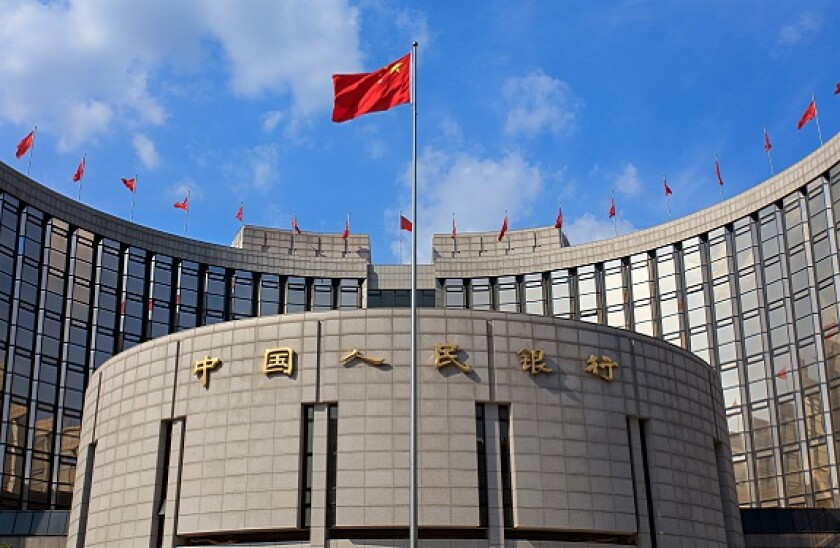China’s Consumer Price Index rose 1.1% year-on-year in June, slower than the 1.3% increase recorded the previous month, Friday data from the National Bureau of Statistics showed. Producer Price Index growth came at 8.8% year-on-year, versus 9% in May.
*
China posted a strong set of credit data in June. New renminbi loans stood at Rmb2.12tr, exceeding market expectations. Outstanding renminbi loans jumped 12.3% year-on-year and broad M2 money supply grew 8.6%, both also beating consensus forecasts. Total social financing increased by a much higher-than-expected Rmb3.67tr.
*
The People’s Bank of China (PBoC) decided to lower banks’ reserve requirement ratio (RRR) by 50bp, effective from Thursday, according to an announcement at the end of last week.
All banks, expect for those that are already subject to an RRR of 5%, will benefit from the new cut. The RRR cut, in answer to a State Council meeting’s call last week, will free up Rmb1tr in long-term liquidity. Chinese financial institutions’ weighted average RRR will be 8.9% after the cut.
The move does not change the PBoC’s "prudent monetary policy", the central bank said in a separate statement.
*
Any company in possession of personal data of at least 1m users must undergo a cybersecurity review before an overseas listing, the Cyberspace Administration of China (CAC) proposed in draft new regulations on Saturday.
An office for cybersecurity reviews will be set up under the CAC and be responsible for the process. The reviews will have a focus on assessing national security risks posed by an oversea listing, including the risk of data being “influenced, controlled or manipulated” by foreign governments post the IPO, the CAC said.
The IPO prospectus is among the documents required for submission for the reviews. The review should be completed in three months but can be extended, according to the draft rules. The public feedback period for the planned regulation runs through July 25.
*
A total of 25 mobile applications by Didi Chuxing Technology Co’s parent company, Beijing Xiaoju Keji Co, have been removed from app stores for “seriously violating” rules on the collection and use of personal data, the CAC announced on its official WeChat account on Saturday.
China had already banned Didi’s main ride-hailing app Didi Chuxing last week, just days after the company’s US IPO.
Didi accepts and obeys regulators’ requirements, and plans to “thoroughly investigate” and “carefully rectify” all of its problems to protect personal data, the company said in a public Weibo statement over the weekend.
*
The US Department of Commerce added 14 China-based companies to its entity list, a move that will subject them to export controls.
The firms are sanctioned for allegedly having “enabled Beijing’s campaign of repression, mass detention, and high-technology surveillance against Uyghurs, Kazakhs, and members of other Muslim minority groups in the Xinjiang Uyghur Autonomous Regions of China”, the department said last Friday. Another five entities that are allegedly “directly supporting” Beijing’s “military modernization programs related to lasers and C4ISR programs” are also added to the list.
China’s Ministry of Commerce (Mofcom) called it an “unjustifiable suppression” of Chinese companies as well as a “serious breach” of international economic and trade rules. Beijing “firmly opposes” the sanctions and urges the US to rectify its decision at once, Mofcom said.
*
The State Administration for Market Regulation (SAMR), China’s antitrust regulator, decided to block a merger of two Chinese videogame streaming platforms owned by Tencent, named Huya and DouYu. Tencent owns more than a third of each company. Both are listed in the US.
Tencent already has a market share of over 40% in the upstream online game operations sector, and a merger of the two platforms — which have a 70%-plus combined market share in the downstream gaming streaming segment — will strengthen Tencent's dominance in the gaming industry, SAMR said.
*
Tsinghua Unigroup’s creditor Huishang Bank has filed to a Beijing court for the bankruptcy restructuring of the company, its listed subsidiary Tsinghua Unisplendour said in a Friday stock exchange filing in Shenzhen. Tsinghua Unigroup, a Chinese semiconductor manufacturer, has defaulted on a number of onshore and offshore bonds.
*
The China Securities Regulatory Commission (CSRC) is taking public feedback for new rules regulating the subsidiaries of futures companies.
Futures companies are required to maintain a net capital of at least Rmb300m over the last 12-month period and have an industry ranking above BBB. The CSRC assigns an annual ranking between AAA and C, D, E to futures companies.
A chapter in the draft regulation is dedicated to overseas subsidiaries of Chinese futures firms. Among other things, futures companies must register with their local CSRC branches within five business days after an internal decision is made to provide funding or credit enhancement to their overseas subsidiaries.
*
Dagong Global Credit Rating has been asked by the CSRC Beijing bureau to conduct a rectification within six months. The agency was punished for the alleged lack of sufficient grounds to adjust the qualitative indicators in its rating models for certain ratings projects, among other things.
*
Car sales dropped 12.4% in June compared to the previous month to 2.015m vehicles, according to the China Association of Automobile Manufacturers. The sale of new energy cars reached an all-time monthly high of 256,000.

